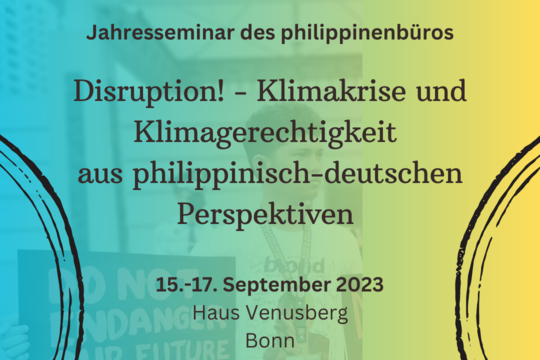The event on deep-sea mining, which took place at the Stiftung Asienhaus on October 2, 2018, gathered people from very diverse backgrounds. It was organized as part of a series of events throughout Germany and Europe, which aimed at drawing attention to Deep-Sea Mining in the Pacific and the local protests against it. General Secretary for the Papua New-Guinean Church Rev. Roger Joseph defended the perspective of the protesting communities, while environment activist Wen Bo explained the role of China as raw materials consumer and producer.
In the oceans, large quantities of valuable raw materials are contained in the seabed. Industry and politics expect to meet the future demand for raw materials for new and old technologies inexpensively. Instead of relying on recycling, sufficiency and sustainability, damaging the under-explored and unique deep-sea ecology permanently is acceptable. Even though international regulations are currently being negotiated (United Nations Convention on the Law of the Sea, UNCLOS) to regulate the mining of deep-sea minerals, there are enormous concerns worldwide about taking the risk at all.
The SOLWARA 1 a project of Nautilus Minerals, a Canadian company, and the Papua New Guinea´s government, is worldwide the first deep-sea mining project, located at 1.600-meter water depth in the Pacific Bismarck Sea. SOLWARA 1 is located approximately 30 km from the nearest coast (New Ireland Province) and 50 km north of the international Port of Rabaul (East New Britain Province). This project is supposed to start in 2019, however many locals in Papua New Guinea gather to demonstrate against it. Deep sea mining goes hand in hand with the poisoning of fish, the destruction of sea life and local livelihoods, and has overall repercussions on the marine ecosystem.
Nora Sausmikat (Head of China-Program, Stiftung Asienhaus) opened the event by giving a few background information about the SOLWARA 1 Project and deep-sea mining in general (including the involvement of German banks and companies). After the introduction, she presented the two speakers: Reverend Roger is the president of the National Council of Churches in Papua New Guinea, and Wen Bo is the founder of Ocean Communication and a former Greenpeace activist.
Reverend Roger, as representative of the catholic church of Papua New Guinea, has made it his goal to alert his countrymen about the negative impacts of deep-sea mining. The SOLWARA 1 Project is at the center of all discussions in Papua New Guinea. This 84.000 km² large country counts 8 Million inhabitants from which 85 percent live in rural regions. Because of the continuous protests, Nautilus Minerals had to change headquarters times already and is now located in New Ireland (Papua New Guinea). The propaganda machinery is trying to convince people of the advantages the projects brings with promises of better roads, health care assistance and the building of schools for a better youth education. Nevertheless, many quickly realized that the project would not only bring infrastructure development, but also inter alia damage sea life permanently. The people of Papua New Guinea spoke out against the project denouncing the fact that, because of the lack of offshore mining regulation on the island, onshore mining laws were used to implement the project.
Civil society organizations, with the support of the church, came together to organize local protests. Reverend Roger highlighted the fact that the minerals are mostly used for the production of new technologies accessories. However, while developed countries see the consumption of new technological accessories as essential, Papua New Guinea inhabitants demand access to clean water and non-poisonous food. The speaker therefore called for action and spread the following message: “The more industrial countries develop new technologies, the more our people will suffer from it.”
Wen Bo presented China´s role in deep-sea mining projects. He explained the dynamics of the country´s development strategy, trying to meet the global demand of raw materials on the one side, while investing in the mining industry on the other. China is indeed not only producing about 90 percent of Rare Earth Elements worldwide, but it is also its biggest consumer. Therefore, the country has a huge political influence in this sector worldwide. China comes into play as main buyer of the minerals. The project has been granted an operating license by the PNG government without having been given free, prior and informed consent of coastal communities.
Currently, legal action launched by Papua New Guinean communities to answer questions about whether the SOLWARA 1 project was lawfully approved.
The discussion following the two inputs was constructive thanks to the active participation of the participants of the event. Reverend Roger stated clearly that the government ruling Papua New Guinea is corrupt, even if, so his words, local democratic structures are very strong and the power remains with the people there. Wen Bo pointed to the importance of raising awareness in China, because most Chinese are not informed about the effects their investments and development aid, have on developing countries like PNG, and especially of the long term repercussions of deep-sea mining projects.
Nathalie Jobert
Die Rundreise wird veranstaltet von: Brot für die Welt, Forum Umwelt und Entwicklung, Ozeanien-Dialog, Misereor, Fair Oceans, PowerShift, Pazifik-Netzwerk, Stiftung Asienhaus, Heinrich-Böll-Stiftung, BUND









